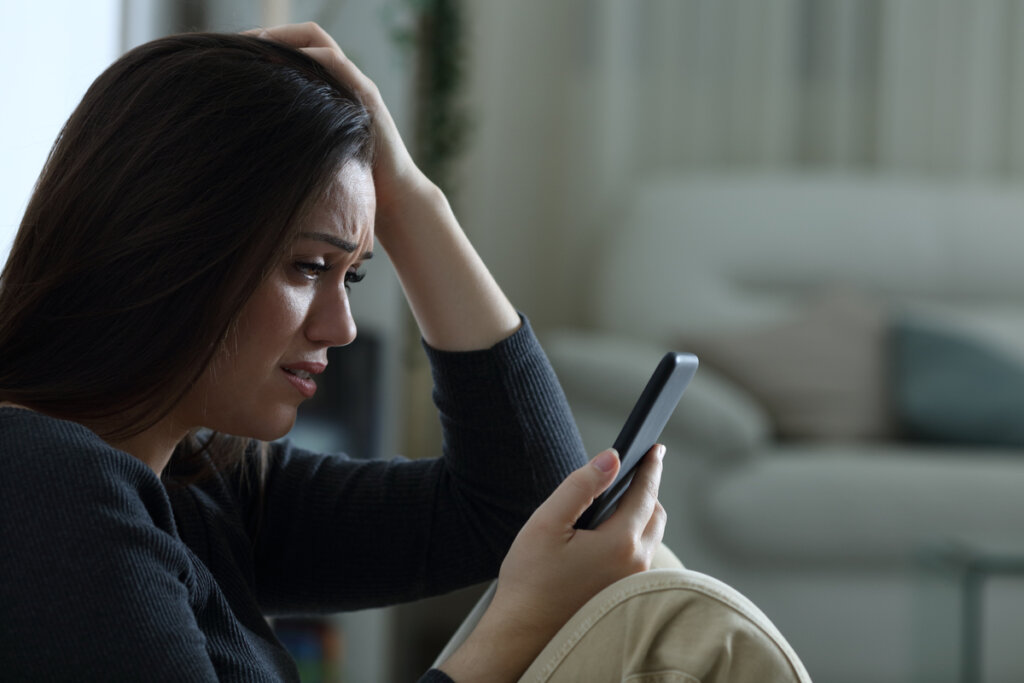The Link Between Social Media and Depression


Written and verified by the psychologist José Padilla
According to the World Health Organization (WHO), approximately 280 million people worldwide suffer from depression. Therefore, we can confidently state that it’s a common mood disorder prevalent throughout the world. In fact, an estimated 3.8 percent of people are affected. These include 5.0 percent of adults and 5.7 percent of adults older than 60.
Researchers from various disciplines, seeking to understand the prevalence of this disorder, have identified that the use of social media may be a key risk factor. According to a study published in the Journal of Social and Clinical Psychology, it may even be a causal factor. This research claimed that the less amount of time individuals used social media, the less depressed and lonely they felt.
Furthermore, recent research has found that people who constantly use social media are more likely to develop depression within the following six months, regardless of their personality.

Social media use linked to depression
As we’ve already mentioned, the use of social media is related to depression. However, the number of investigations that have studied how personality traits might interact with the two elements has grown significantly in recent times. For example, a study published in the Journal of Affective Disorders Reports set out to address the issue.
The data was obtained from a US sample of 978 people aged 18 to 30 years. The measures used included the PHQ-19 ( Patient Health Questionnaire ) which assesses depression and the Big Five Inventory which assesses openness, conscientiousness, extraversion, agreeableness, and neuroticism. To measure social media use, a self-report of the top ten social media used by participants was used.
The results of the study
Among the findings was that people high in agreeableness were 49 percent less likely to become depressed than people who scored low in this category. On the other hand, those with high neuroticism scores were twice as likely to develop depression as those with low neuroticism.
The relationship between neuroticism and depression is consistent with previous studies. Indeed, experts describe this personality trait as a strong predictor of depressive disorders (Kotov et al., 2010; Noteboom et al., 2016). Additionally, neuroticism is associated with decreased life satisfaction and decreased positive affect.
The most relevant of these results was that, regardless of personality type, the use of social media increased the risk of future diagnoses of depression. In addition, for every personality trait, social media use was strongly associated with the development of depression.
Why does social media lead to mental health problems?
The explanations behind the link are that, on social media, people are more likely to compare themselves to others who appear to be living their best lives. This breeds resentment, low self-esteem, and other issues associated with self-image and self-concept.
Another explanation is that, paradoxically, social media can isolate people and make them feel lonely. This is because the time they dedicate to it takes away space for social interactions in real life. In addition, social media affects the way people maintain their relationships and interact with others.
“Connecting with people virtually can increase the risk of miscommunication or misperception leading to relationship difficulties and the potential risk of developing mental health problems”, claimed Merril, one of the authors of the study.
This study is one of many that speak out about the negative impacts of social media on mental health. Indeed, several studies have already indicated that prolonged use of social media platforms may be related to negative signs and symptoms of depression, anxiety, and stress (Berryman et al, 2018; O’Reilly et al, 2018). Also, they can create pressure on people to conform to certain stereotypes or to be as popular as others.

How to prevent the negative effects of social media
Firstly, we must emphasize that social media isn’t all bad. It does have some positive benefits. The bottom line is knowing how to use it. To prevent any adverse effects, it’s crucial that you pay attention to how you use it on a daily basis (how much and for what purpose).
We suggest you install apps on your cell phone that help you track how much and how you’re using social media. If these get too annoying, consider turning off your notifications for a while or deleting the app from your phone until you feel better.
The double-edged sword of the various digital platforms is that, while they can help you socialize when you feel down, they can also worsen your unhealthy thought patterns. Finally, if you feel that you can’t handle your social media usage or the depressive symptoms it may be generating, consider contacting a therapist. A trained mental health professional will help you design a plan tailored to fit your own problems and needs.
All cited sources were thoroughly reviewed by our team to ensure their quality, reliability, currency, and validity. The bibliography of this article was considered reliable and of academic or scientific accuracy.
- Berryman, C., Ferguson, C. J., & Negy, C. (2018). Social media use and mental health among young adults. Psychiatric quarterly, 89(2), 307-314.
- Hunt, M. G., Marx, R., Lipson, C., & Young, J. (2018). No more FOMO: Limiting social media decreases loneliness and depression. Journal of Social and Clinical Psychology, 37(10), 751-768.
- Ivie, E. J., Pettitt, A., Moses, L. J., & Allen, N. B. (2020). A meta-analysis of the association between adolescent social media use and depressive symptoms. Journal of affective disorders, 275, 165-174.
- Jensen, R. A., Kirkegaard Thomsen, D., O’Connor, M., & Mehlsen, M. Y. (2020). Age differences in life stories and neuroticism mediate age differences in subjective well‐Applied Cognitive Psychology, 34(1), 3-15.
- Karim, F., Oyewande, A. A., Abdalla, L. F., Ehsanullah, R. C., & Khan, S. (2020). Social media use and its connection to mental health: a systematic review. Cureus, 12(6).
- Kotov, R., Gamez, W., Schmidt, F., & Watson, D. (2010). Linking “big” personality traits to anxiety, depressive, and substance use disorders: a meta-analysis. Psychological bulletin, 136(5), 768.
- O’reilly, M., Dogra, N., Whiteman, N., Hughes, J., Eruyar, S., & Reilly, P. (2018). Is social media bad for mental health and wellbeing? Exploring the perspectives of adolescents. Clinical child psychology and psychiatry, 23(4), 601-613.
- Merrill, R. A., Cao, C., & Primack, B. A. (2022). Associations between social media use, personality structure, and development of depression. Journal of Affective Disorders Reports, 10, 100385.
- Noteboom, A., Beekman, A. T., Vogelzangs, N., & Penninx, B. W. (2016). Personality and social support as predictors of first and recurrent episodes of depression. Journal of affective disorders, 190, 156-161.
- University of Arkansas. (2022, 3 de octubre). Social media use linked to developing depression regardless of personality. https://news.uark.edu/articles/62109/social-media-use-linked-to-developing-depression-regardless-of-personality
- Depression Fact Sheet. (2020). Retrieved from: https://www.who.int/news-room/fact-sheets/detail/depression (accessed March 09, 2021).
This text is provided for informational purposes only and does not replace consultation with a professional. If in doubt, consult your specialist.








